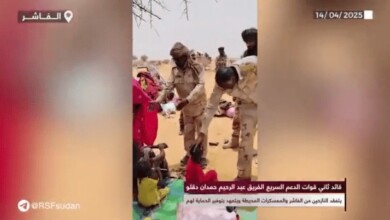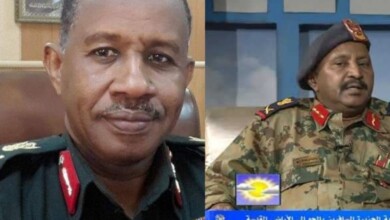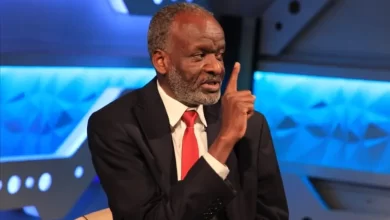The Islamists’ War on Sudan… Genuine or intentional forgetfulness ?
Sara Malik Al-Saeed

What one fears most is the genuine or intentional forgetfulness in regards to a subject in which public opinion and pressure from countries and international institutions play an important role in light of the absence of military parity capable of putting an end to the daily massacres carried out by the Sudanese Armed Forces (SAF) and its terrorist battalions as well as end the continuous destruction of the various regions and areas across the Sudanese territory.
Time is usually the weapon of choice for those who wish to forget. However, they will look for reasons and excuses to justify their actions regardless of the time factor. Are the Sudanese facing more death and destruction as a result of their act of genuine or intentional forgetfulness of their previous suffering ? And thus granting the extremist Islamic battalions as well as the Sudanese Army free rein to do as they please on military and -by extension- political fronts ?? Are the Sudanese now choosing, along with the world, to voluntarily enter a phase of oblivion and an era of ignoring the massacres taking place in the states of Al-Jazeera, Um Rawaba, Bahri and Singa, and then promptly focusing on dividing Sudan as an alternative deemed acceptable by Al-Kizan ?
In regards to the Islamists’ wars on the Sudanese people, it bears similar consequences, whether the suffering continues as a result of forgetting or pretending to forget, with prior knowledge that the pain that accompanies deliberate forgetfulness is much more significant than the pain associated with forgetting, especially if the former is practiced by the Sudanese themselves.
Forgetting is usually part of human nature and there are benefits that makes it a blessing, for example, when it comes to forgetting sorrows or the loss of loved ones. As for intentional forgetfulness, it is a deliberate act. Its darkest forms relate to crimes and tragedies of a comprehensive and unjust nature, such as the mass destruction and massacres committed by Sudanese terrorists against the Sudanese people for ethnic and racist motives -continuously- and for more than thirty years. As the act of deliberate forgetfulness in such cases can amount to the level of complicity, allowing the perpetrators to continue to commit crimes.
Peace of conscience may sometimes be achieved by forgetting; however, it cannot come from pretending to forget or turning a blind eye. On the contrary, the latter actions may lead, through its negative and bloody effects, either to a tortured conscience or to the creation of a state of fatigue or psychological anxiety accompanied by guilt.
In any case, the Islamists don’t inherently need an excuse to commit their crimes, nor do they want any pressure urging them to stop such crimes from taking place, which -in turn- makes forgetting or neglecting to remember a state that suits the criminal mentality of Al-Kizan and its goals, as it clears the path for them to choose freely and exploit the consequences of genuine or intentional forgetfulness in order to serve their agenda.
For example, the Islamists won’t forget the humiliation that befell them within the context of the December Revolution that overthrew their regime, destroyed their dreams of ruling Sudan indefinitely and deprived them of historical privileges they inherited from a foreign colonizer without right, while they seem to forget the criminal operations they have been carrying out for decades against the Sudanese people, regardless of how extreme those crimes were from an International and Humanitarian Law point of view.
The answer to such a question can be summed up simply; the Islamists use both paths: genuinely forgetting and neglecting to remember in order to serve their goals, unlike the Sudanese people, who utilize the aforementioned ideas against their favor, as the world does the same to the Sudanese.
Forgetting, remembering and intentional forgetfulness thus become political tools to serve certain paths and policies, or to support an optional extremist ideological narrative from which the Sudanese Islamic Movement choses and ignores in accordance with its wishes in order to achieve its goals.
Reshaping history and reality require the ability and desire to selectively use the weapon of forgetting and disregarding, which enables the actor, in this case the Islamic Movement, to commit whatever crimes, sins and lies it deems necessary, considering the aforementioned to be its unequivocal right and no one else’s, without any regard for International or Humanitarian Law.
Incidentally, the Rapid Support Forces (RSF) use these options to support their position or policies aimed at ending the war or restoring the democratic civil path. Thus, the act of forgetting or disregarding stops being a behavior to become a weapon of leverage, if used as a means to justify a certain behavior or policies, or to overlook them in a way that allows them to continue, as is the current situation in Sudan for the past two years.
The act of intentional forgetfulness encompasses deliberate neglect and disregard of the ongoing conflict in Sudan, which is in fact a conscious and aware political decision that ignores the wars and horrors already taking place, as well as disregards the consequences of these wars: whether its killing, genocide or destruction. Neglect in this case is practiced with the aim of claiming or pretending that life has returned to normal as if there’s nothing to worry about, rage over or reject. In which case, the state of neglect, when it means neglecting aggression and its consequences, amounts to the level of accepting that aggression and its consequences without actually disclosing that fact.
Terms are now being used to reflect the choices adopted by countries in the region and the world in different forms and degrees that reflect either a state of political and moral bankruptcy or the absence of other options that may constitute more firm and effective positions in dealing with the conflicts currently taking place in the Middle East region.
Resorting to forgetting or intentional forgetfulness and neglect indicates that in cases of conflict in regards to the position of the State that resorts to it; meaning that forgetting or neglecting gives an indication of acceptance or compliance without the need to announce that position in an effort to avoid embarrassment or for fear of the reactions of others -or even the people concerned- to such a position.
Forgetting or deliberate forgetfulness are a negative phenomenon, and considering them as an expression of non-position as some people imagine, is a mistake, as they’re a position, whether it’s a negative or active position, depending on where this or that country stands in regards to the conflict in question. There are types of conflict that renderes genuine or intentional forgetfulness useless, because that entails the continuation and even exaggeration of brutality and destruction, and an example of such is the ongoing wars of the Islamic Movement against the Sudanese people.
The policy of non-position through an act of forgetting or disregarding actually conveys implicit approval and silent acceptance, and this is something that everyone ought to understand, especially the civil forces in Sudan. Such a conflict can only tolerate a clear, explicit position that decisively, publicly and interactively rejects the Islamic Movement and its Army so that the cycle of violence can be stopped. Otherwise, the position of intentional or deliberate forgetfulness will be closer to the shy approval in its poor condition, which reflects in its consequences the old saying “I was eaten the day the white bull was eaten.”





